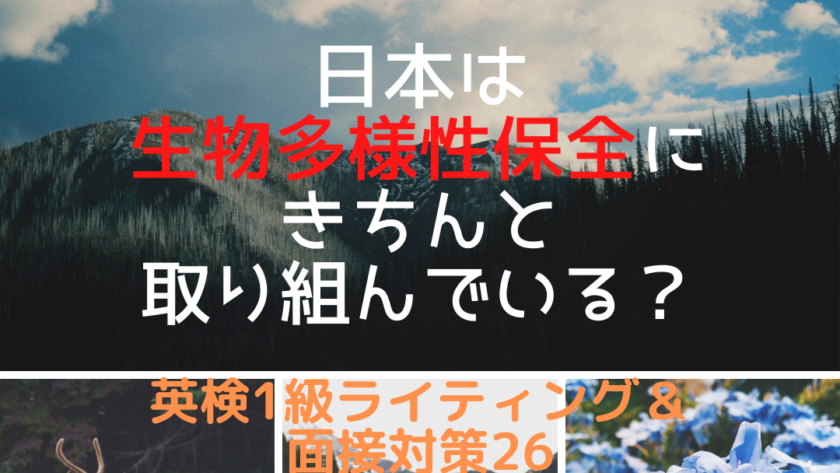目次
Yes Or No: Is Japan tackling the conservation of biodiversity properly?
POINTS: Limited Access / School Education / Collaboration Work With Local Governments / Media Influence / Quarantine / Chemicals
観点:アクセス制限 / 学校教育 / 地方行政との合同ワーク / メディアの影響 / 検疫 / 化学薬品
生物多様性保全の背景
生態系破壊への懸念は1970年頃から問題視され始めていました。ラムサール条約(特に水鳥の生息地として国際的に重要な湿地に関する条約)とワシントン条約(絶滅のおそれのある野生動植物の種の国際取引に関する条約)が同時期に発効され効果をもたらしたことから、この二つの条約を補充しより包括的な取り組みを行うために生物の多様性に関する条約が1992年に採択されました。日本は翌1993年に条約を締結し、それから長年かけて国内での法律の設定や戦略策定など行ってきました。
このトピックでエッセイを書くに前に、生物多様性保全とは具体的にどういうことなのかを理解しないと、日本の取組が十分なのかそれとも不十分なのかは判断が難しいでしょう。 また、自分の住んでいる市町村では生物多様性保全に関し何か取り組みを行っているのか?どういう取り組みなのか?等を調べることにより、トピックがより身近に感じられるようになるでしょう。
過去50年で生物多様性は68%減少 地球の生命の未来を決める2020年からの行動変革 |WWFジャパン
生物多様性条約とは? 目的・概要・日本の取り組みをわかりやすく解説 | ELEMINIST(エレミニスト)
Biodiversity conservation – DCCEEW
Conserving Biodiversity | U.S. Agency for International Development

賛成派:日本は生物多様性保全にきちんと取り組んでいる(221 語)
Yes Or No: Is Japan tackling the conservation of biodiversity properly?
POINTS: Limited Access / School Education / Collaboration Work With Local Governments
Introduction
Japan, in my view, has exceptionally been working on biodiversity conservation by restricting private vehicle access to designated areas, educating school children and caring for connectivity for small mammals residing in divided forests.
特定の場所では自家用車の乗り入れを制限したり、子供たちに教育それについて教育したり、小動物が分断された森を行き来できるようにしたり、日本は生物多様性保全にとても良く取り組んでいると思います。
Discussion 1
Private vehicles have been banned in some National Parks, such as Tateyamakurobe in Toyama and Shiretoko in Hokkaido, to mitigate habitat destruction and degradation for several decades. Of course, the restriction on its own is not good enough to conserve the areas or species, but when it started is notable.
生息地破壊や劣化を緩和するために、富山県の立山黒部や北海道の知床など、何十年間も自家用車の乗り入れを禁止している国立公園もあります。もちろん、この制限だけではその地域や種を保全するのに十分ではありませんが、何十年も前にそれを始めたという所に意味があるのです。
Discussion 2
Another contributor to the conservation of biodiversity is education about it at schools. Informed young generations are inevitable to continue to carry out existing conservation work. If the vast majority of the citizens were aware of the importance of biodiversity conservation, it would be much easier to introduce new measures for biodiversity conservation.
学校での生物多様性保全に関する教育もそれに貢献しているものの一つです。既にある保全活動を引き継ぐには、知識を持った若い世代は必要不可欠です。国民の大多数が生物多様性保全の重要さに気付いていれば、保全のための新しい施策を始めるのはずっと容易いことでしょう。
Discussion 3
Many local governments also work on biodiversity conservation, along with local companies and volunteers. A forest, where a species of dormouse resides, has been divided by roads in my region. But, they built animal passways over the streets so that small mammals could cross safely, which could restore its possibly divided home range.
多くの地方自治体も地元企業やボランティア達と一緒に生物多様性保全に取り組んでいます。私の住む地方では、ヤマネが棲む森林が道路によって分断されています。しかし、アニマルパスウェイが道路上に建設されたことにより、小動物は安全に道路を渡る事ができます。森林分断により動物の行動圏も分けられてしまったかもしれませんが、アニマルパスウェイははそれを元に戻す事を可能にしてくれるでしょう。
Conclusion
As outlined above, Japan started to tackle biodiversity conservation well before the intensive introduction of the concept of biodiversity conservation as one of the SDGs and has meaningfully been doing so since then.
前述のように、生物多様性保全の概念がSDGsのひとつとして集中的に取り入れられるようになるずっと以前から、日本は生物多様性保全に取り組み始め、それ以来、しっかりと取り組めていると思います。
賛成派:全文(音声付き)
Japan, in my view, has exceptionally been working on biodiversity conservation by restricting private vehicle access to designated areas, educating school children and caring for connectivity for small mammals residing in divided forests.
Private vehicles have been banned in some National Parks, such as Tateyamakurobe in Toyama and Shiretoko in Hokkaido, to mitigate habitat destruction and degradation for several decades. Of course, the restriction on its own is not good enough to conserve the areas or species, but when it started is notable.
Another contributor to the conservation of biodiversity is education about it at schools. Informed young generations are inevitable to continue to carry out existing conservation work. If the vast majority of the citizens were aware of the importance of biodiversity conservation, it would be much easier to introduce new measures for biodiversity conservation.
Many local governments also work on biodiversity conservation, along with local companies and volunteers. A forest, where a species of dormouse resides, has been divided by roads in my region. But, they built animal passways over the streets so that small mammals could cross safely, which could restore its possibly divided home range.
As outlined above, Japan started to tackle biodiversity conservation well before the intensive introduction of the concept of biodiversity conservation as one of the SDGs and has meaningfully been doing so since then.
反対派:日本は生物多様性保全への取組みは不十分だ(253 語)
Yes Or No: Is Japan tackling conservation of biodiversity properly?
POINTS: Media Influence / Quarantine / Chemicals
Introduction
The Japanese government has ostensibly been working on biodiversity conservation lately. Its strategies, however, seem not good enough to maintain the existing biodiversity. It’d better make more effort to instil the concept or importance of biodiversity conservation in its citizens, enhance the current quarantine and ban the use of specified pesticides.
最近、日本政府は生物多様性保全に表向きは取り組んでいますが、その戦略は現存する生物多様性を維持するには十分ではないようです。政府は、生物多様性保全の概念と重要性を国民に浸透させること、現在の検疫を強化すること、特定の農薬の使用を禁止することにおいて、もっと努力すべきです。
Discussion 1
The government should have more control over threatened species. Most nationalities other than the Japanese would hesitate to eat endangered species. Japanese eels and Pacific Bluefin Tunas are, for instance, seasonal or traditional feasts many people believe they must eat. They are, however, listed as threatened and vulnerable species, respectively.
政府は絶滅危惧種に関しもっと管理をすべきです。日本人以外のほとんどの国の人は絶滅危惧種を食すことを躊躇うでしょう。例えば、日本うなぎや本マグロは季節的または伝統的なご馳走で、必ず食べなければいけないと思っている人は多いでしょう。しかし、それらの種はそれぞれ絶滅危惧種と危急種に指定されています。
Discussion 2
Another thing the Japanese government could enforce is its quarantine system to stop alien species from penetrating and taking root in Japan, which may negatively impact the ecosystems. There are some restrictions on what can be brought into Japan, but it is all up to honest declarations of passengers and spot checks at Customs when entering the country. To date, invasive species, such as fire ants and red-back spiders, have been increasingly detected in Japan.
外来種が日本に持ち込まれ根付いてしまうのを防ぐのに、これは日本の生態系に悪影響を及ぼしかねないのですが、日本政府が他に強化できる事としては、検疫を強化することが挙げられます。日本に持ち込める物には制限がありますが、すべては乗客の正直な申告と入国の際の税関でのスポットチェックに頼っている状況です。今日まで、ヒアリやセアカゴケグモのような外来種は日本でますます発見されてきています。
Discussion 3
Lastly, more kinds and quantities of pesticides and herbicides are admitted to use in Japan than in other countries. These chemicals must kill diverse insects, including bees, necessary for pollination. Agricultural runoff containing these toxins also degrades the quality of the soil and watercourses.
最後に、日本では他国より多くの種類・量の農薬の使用が認められています。このような化学薬品は、はちを含む受粉に必要な多種の昆虫を殺しているのです。このような有害物質を含む農業排水も、土壌や水質を低下させています。
Conclusion
Even implementing all the measures above on top of the current ones may not slow down the biodiversity loss, so I think what Japan is doing for biodiversity conservation is far from sufficient.
現在実行している施策に加え、前述のすべてを実行しても、生物多様性の損失のスピードを落とすことは出来ないかもしれません。ですから生物多様性保全のための日本の取組みは、十分からほど遠いと考えます。
反対派:全文(音声付き)
The Japanese government has ostensibly been working on biodiversity conservation lately. Its strategies, however, seem not good enough to maintain the existing biodiversity. It’d better make more effort to instil the concept or importance of biodiversity conservation in its citizens, enhance the current quarantine and ban the use of specified pesticides.
The government should have more control over threatened species. Most nationalities other than the Japanese would hesitate to eat endangered species. Japanese eels and Pacific Bluefin Tunas are, for instance, seasonal or traditional feasts many people believe they must eat. They are, however, listed as threatened and vulnerable species, respectively.
Another thing the Japanese government could enforce is its quarantine system to stop alien species from penetrating and taking root in Japan, which may negatively impact the ecosystems. There are some restrictions on what can be brought into Japan, but it is all up to honest declarations of passengers and spot checks at Customs when entering the country. To date, invasive species, such as fire ants and red-back spiders, have been increasingly detected in Japan.
Lastly, more kinds and quantities of pesticides and herbicides are admitted to use in Japan than in other countries. These chemicals must kill diverse insects, including bees, necessary for pollination. Agricultural runoff containing these toxins also degrades the quality of the soil and watercourses.
Even implementing all the measures above on top of the current ones may not slow down the biodiversity loss, so I think what Japan is doing for biodiversity conservation is far from sufficient.
まとめ
生物多様性保全と一言でいえども、それ一つが学問になるくらいですから非常に奥の深いトピックです。知れば知るほど、自分の意見が変化していくのを感じた人もいたのではないでしょうか?一度とは言わず、少し時間をあけてもう一度、このトピックでエッセイを書いてみてほしいと思います。社会は常に動いていますし、自分の理解度も上がっていることでしょう。また、違った切り口のエッセイが書けるのではないでしょうか?
今回のエッセイを機に、もっと環境の事を考えて日常生活を送る人が増えてくれることを期待しています。
こちらの記事もお薦めです。英検1級ライティング&面接対策 25【日本は二重国籍を認めるべきか?】




